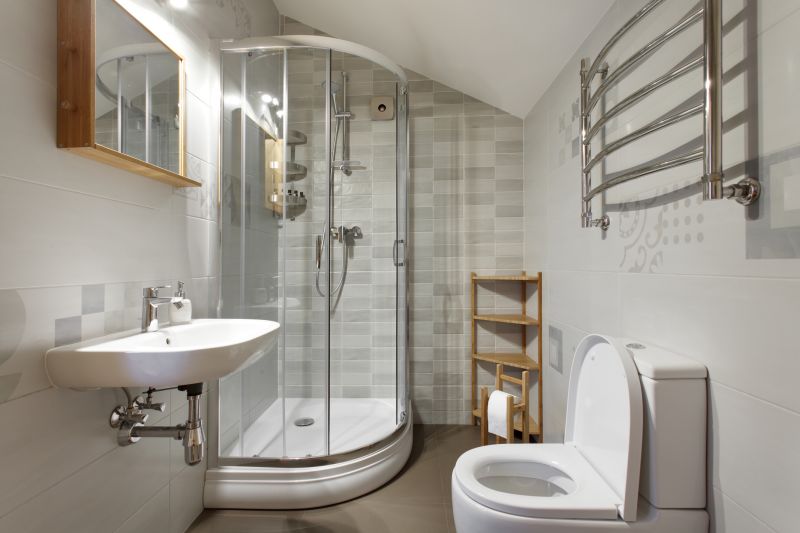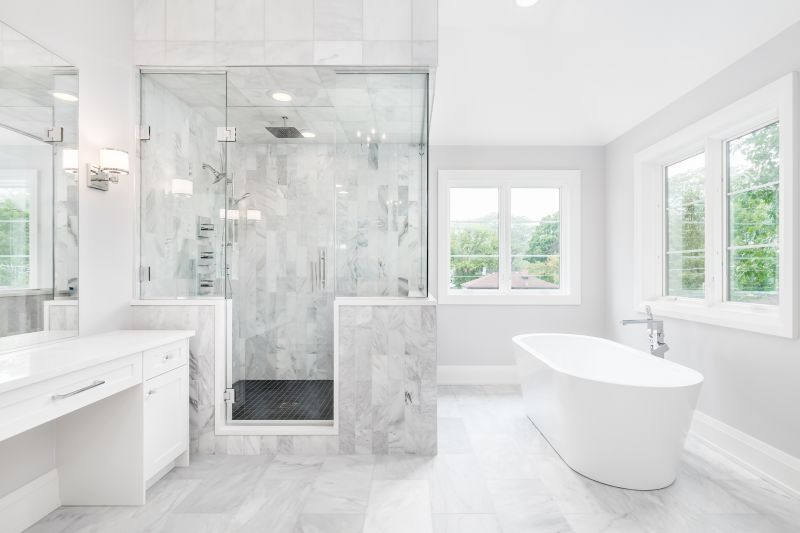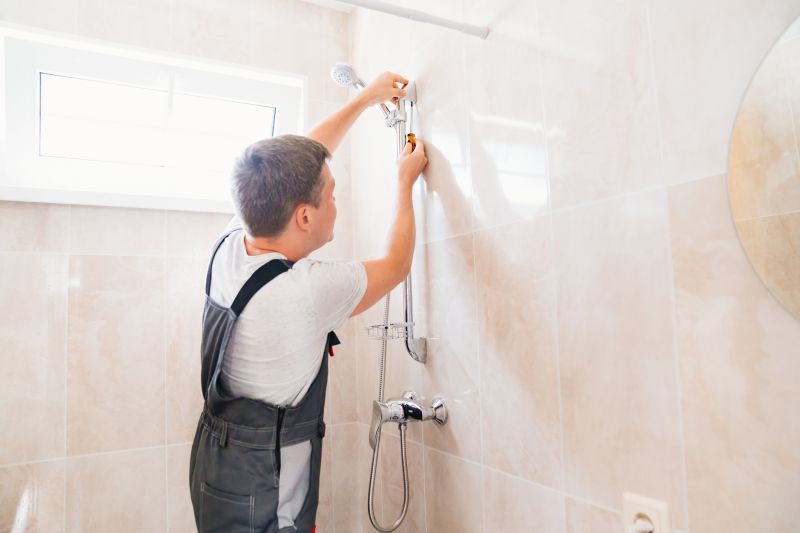Shower Installation Cost Guide
Welcome to Aberdeen Showers
Shower Installation Cost Guide

About Shower Installation Cost Guide
Shop for Shower Installation Cost Guide
When planning a bathroom renovation, one of the most significant decisions homeowners face is selecting the right type of shower installation. The choice can greatly impact the overall aesthetic, functionality, and budget of the project. Understanding the various options available is crucial for making an informed decision that aligns with your needs and space.
Three popular shower installation options include prefabricated shower kits, custom-tiled showers, and walk-in showers. Each option offers distinct advantages and disadvantages, catering to different preferences and requirements. Evaluating these options can help you determine the best fit for your bathroom.
Prefabricated shower kits are a popular choice for those looking for a straightforward and quick installation. These kits come in various styles and sizes, making them a versatile option for many bathrooms. They typically include all necessary components, such as walls, base, and doors, which can simplify the installation process.
Custom-tiled showers offer a more personalized touch, allowing homeowners to choose from a wide array of tiles and designs. This option provides the opportunity to create a unique and luxurious space that reflects personal style. However, custom-tiled showers often require more time and effort to install, as well as a greater investment in materials and labor.
Walk-in showers are increasingly popular due to their accessibility and modern look. They do not require a door or curtain, providing an open and spacious feel. This option is particularly appealing for those seeking a sleek, minimalist design. However, walk-in showers may necessitate additional waterproofing measures to prevent water from escaping the shower area.
When comparing these options, it's essential to consider factors such as budget, space, and desired aesthetic. Each type of shower installation has unique characteristics that may align better with specific needs and preferences. Below is a compact comparison table to help clarify the pros and cons of each option:
| Option | Pros | Cons |
|---|---|---|
| Prefabricated Shower Kits | Easy installation, cost-effective, variety of sizes | Limited customization, less luxurious |
| Custom-Tiled Showers | Highly customizable, luxurious appearance | Higher cost, longer installation time |
| Walk-In Showers | Modern design, accessible | Requires more waterproofing, potential for water spread |
When deciding on the right shower installation, consider where each option fits best:
- Prefabricated shower kits suit quick renovations and budget-conscious projects.
- Custom-tiled showers are ideal for luxury upgrades and personalized designs.
- Walk-in showers work well in modern spaces and for improved accessibility.
By carefully weighing the pros and cons of each type of shower installation, you can make a choice that enhances the functionality and beauty of your bathroom while aligning with your personal preferences and budgetary constraints.
Comparing Shower Material Options
Shop for Comparing Shower Material Options
A Guide to Choosing the Right Material for Your Shower
When planning a shower installation, selecting the right material is crucial for both aesthetics and functionality. Homeowners have several options to consider, each with its own set of advantages and disadvantages. In this article, we will explore three popular shower material options: tile, acrylic, and fiberglass. By understanding the characteristics of each, homeowners can make an informed decision that suits their style and budget.
Tile: Tile is a classic choice for showers, offering a wide range of design possibilities. Made from materials such as ceramic, porcelain, or natural stone, tile can create a luxurious look. However, it requires regular maintenance to prevent mold and mildew in the grout lines. Installation can be labor-intensive, which may affect the overall expense. Despite these considerations, tile remains a popular choice for those seeking a customized and elegant appearance.
Acrylic: Acrylic shower materials are known for their durability and ease of maintenance. They are available in various colors and styles, making them a versatile choice for many homeowners. Acrylic is resistant to stains and scratches, and its smooth surface makes cleaning a breeze. On the downside, acrylic may not offer the same high-end look as tile or natural stone. Nonetheless, it is a practical option for those seeking a balance between aesthetics and functionality.
Fiberglass: Fiberglass is another common option, appreciated for its affordability and quick installation. It is lightweight and can be molded into various shapes, allowing for seamless designs. Fiberglass is less expensive than tile and requires minimal upkeep. However, it is more prone to scratching and fading over time. This material is often chosen for budget-conscious projects or for those who prioritize ease of installation and maintenance.
| Option | Pros | Cons |
|---|---|---|
| Tile | Customizable, luxurious appearance | Requires maintenance, labor-intensive installation |
| Acrylic | Durable, easy to clean | Less high-end appearance |
| Fiberglass | Affordable, quick installation | Prone to scratches and fading |
- Tile: Ideal for those seeking a high-end, customized look.
- Acrylic: Suitable for homeowners who value durability and low maintenance.
- Fiberglass: Fits well with budget-conscious projects or quick renovations.

Installation Approaches: DIY vs. Professional
Shop for Installation Approaches
Evaluating the Pros and Cons of DIY and Professional Shower Installations
Homeowners looking to upgrade their bathrooms often face the decision of whether to undertake the shower installation themselves or hire a professional. This choice can significantly impact the overall project, from cost to quality and time investment. Both approaches come with their own sets of advantages and drawbacks, and understanding these can help in making an informed decision.
One of the primary considerations is the level of skill and experience required. A self-installation might appeal to those who enjoy hands-on projects and have a good understanding of plumbing and construction. However, it's important to recognize the potential for mistakes, which could lead to additional expenses if corrections are needed. On the other hand, hiring a professional typically ensures that the job is done correctly the first time, leveraging their expertise and experience in handling complex installations.
Time is another critical factor. Completing a project on your own can be time-consuming, especially for those balancing work and family commitments. Professional installers usually work on a schedule and can complete the job more quickly, minimizing disruption in the home. This can be particularly beneficial for those with limited time to dedicate to home improvement projects.
Cost considerations are also crucial. While self-installation might initially seem less expensive, the potential for unforeseen complications and the need for special tools can add up. Professional services come with their own expenses, but they often include guarantees for their work, providing peace of mind that any issues will be addressed without additional charges.
Another aspect to consider is the complexity of the project. Simple shower installations might be manageable for a self-installer, but more intricate designs or systems, such as those involving custom tiling or advanced plumbing, could benefit from professional expertise. Complex projects require precision and a deep understanding of construction standards, which professionals are trained to meet.
| Option | Pros | Cons |
|---|---|---|
| Self-Installation | Cost savings, personal satisfaction | Risk of errors, time-consuming |
| Professional Installation | Expertise, time efficiency | Higher initial expense |
- Self-installation fits those with DIY skills and time.
- Professional installation suits complex projects.
- Consider professional help for time-sensitive tasks.
- Evaluate skill level and tools before choosing self-installation.




